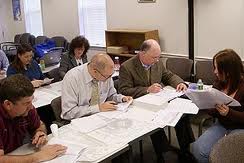1. Aim:
Core definition:
An aim is an overall specification of the intention or purpose of a programme of study or institutional mission or policy.
Explanatory context:
A programme of study may specify one or more aims. These are generally specified so as to encompass the purpose and philosophy of the programme. Programme aims are usually further elaborated by programme objectives or programmes outcomes. These are usually framed to indicate what students will be able to do as a result of studying the programme.
Programme (or course) aims specify the overall direction and content of a programme of study. Module aims would do the same for a subunit of a programme, usually showing how they relate to the overall programme aims.
2. Goal:
A goal is a projected state of affairs that a person or a system plans or intends to achieve a personal or organizational desired end-point in some sort of assumed development. Many people endeavor to reach goals within a finite time by setting deadlines.
Definition:
The word ‘goals’ is one that has many meanings, (especially to soccer players 😉 so we’d better define it. When we talk about goals here, we mean:
An intended outcome
that requires action
that satisfies needs
Timescales:
i. Short-term goals:
We are often driven in the short-term by things which are urgent to us, rather than those things which are truly important and which align with our longer-term goals.
Short-term goals are often to relieve short-term pressure. It is very possible to be constantly driven by these goals, which can turn out to be very unsatisfying in the longer term.
ii. Longer-term goals:
We also take on goals that guide our longer-term intent and actions. These often have medium-term and intermediate goals to satisfy us that we are on the right road and going somewhere.
3. Objective:
The desired or needed result to be achieved by a specific time. An objective is broader than a goal, and one objective can be broken down into a number of specific goals. It is measurable, defined, operational, simple steps, and specific. Objectives contribute to the fulfillment of specified goals. Complete with a beginning and an end.
Core definition: An objective is:
(a) A specific statement about what students are expected to learn or to be able to do as a result of studying a programme: more specifically this is a learning objective;
(b) A measurable operationalisation of a policy, strategy or mission: this is an implementation objective.
Explanatory context:
A programme will have several objectives, which are detailed breakdowns of broad aims. They are sometime referred to as ‘objectives’, ‘outcomes’ ‘learning objectives’ or ‘learning outcomes’.
Types of Objectives:
· Measurable objectives provide direction for action. They have baselines.
· Developmental objectives provide a vision for a desired outcome or health status but have no data.
4. Definition of Vision:
The act of seeing external objects actual sight. The faculty of seeing; sight; one of the five senses, by which colors and the physical qualities of external objects are appreciated as a result of the stimulating action of light on the sensitive retina, an expansion of the optic nerve.
Especially, that which is seen otherwise than by the ordinary sight, or the rational eye; a supernatural, prophetic, or imaginary sight; an apparition; a phantom; a specter; as, the visions of Isaiah. Hence, something unreal or imaginary; a creation of fancy. To see in a vision; to dream.
5. Definition of mission:
The act of sending, or the state of being sent; a being sent or delegated by authority, with certain powers for transacting business; comission.
That with which a messenger or agent is charged; an errand; business or duty on which one is sent; a commission. An assotiation or organization of missionaries; a station or residence of missionaries.
Examples of Vision, Mission, Goals, Purpose, Objectives:
Vision: Serve as the resource and representative for facility management.
Mission: Advance the facility management profession by providing exceptional services, products, resources, and opportunities.
Goals:
- Support a community that fosters vitality, momentum and impact for the facility management professional. (Stakeholder Perspective)
- Anticipate and prioritize the resources required to enhance effective delivery of products and services. (Internal Perspective)
- Inspire passion for the facility management profession that compels facility practitioners to want to join the IFMA network, engages volunteer leaders and retains/attracts top-talent to the full-time staff. (Learning & Growth Perspective)
- Sustain IFMA’s financial integrity to achieve and fulfill our mission. (Financial Perspective)
Purpose: IFMA is a member-centered association that exists to guide and develop facility management professionals. In support of its members, IFMA promotes the facility management profession by providing leadership, recognition and standards of excellence.
Objectives:
- Provide and engage stakeholders with opportunities that expand and leverage their collective knowledge and experiences
- Provide career essentials for facility management professionals to advance their careers
- Magnify the importance of the facility management professional worldwide
- Ensure appropriate governance, systems and processes are in place
- Understand and respond to stakeholder needs
- Strengthen and build collaborative relationships that advance the FM profession
- Motivate and inspire members to become committed and involved volunteer leaders
- Create a culture and provide resources that instill innovation, passion, challenge and meaning with staff and volunteers
- Maintain viable fiscal position through good financial management, diversification of revenues and optimized asset utilization
6. Evaluation:
Evaluation is a methodological area that is closely related to, but distinguishable from more traditional social research. Evaluation utilizes many of the same methodologies used in traditional social research, but because evaluation takes place within a political and organizational context, it requires group skills, management ability, political dexterity, sensitivity to multiple stakeholders and other skills that social research in general does not rely on as much. Here we introduce the idea of evaluation and some of the major terms and issues in the field.
Definitions of Evaluation
Probably the most frequently given definition is:
Evaluation is the systematic assessment of the worth or merit of some object
This definition is hardly perfect. There are many types of evaluations that do not necessarily result in an assessment of worth or merit — descriptive studies, implementation analyses, and formative evaluations, to name a few. Better perhaps is a definition that emphasizes the information-processing and feedback functions of evaluation. For instance, one might say:
Evaluation is the systematic acquisition and assessment of information to provide useful feedback about some object
References:
- http://www.tpub.com/content/administration/14300/css/14300_81.htm, Access on 21st April, 2010.
- http://www.uic.edu/sph/dataspeak/sept98/overheads/maiese/tsld004.htm, Access on 21st April, 2010.
- http://www.brainyquote.com/words/mi/mission190842/, access on 21st April, 2010.
- http://www.health.state.mn.us/divs/hpcd/chp/hpkit/text/eval_types.htm. Access on 21st April, 2010.
- http://www.socialresearchmethods.net/kb/intreval.php, Access on 21st April, 2010.
- http://som.flinders.edu.au/FUSA/SACHRU/PEW/evalzone/types.htm, Access on 21st April, 2010.
- http://www.evaluators webring.net/Independent_evaluators_webring_definitions_May06.pdf, Access on 21st April, 2010.
















